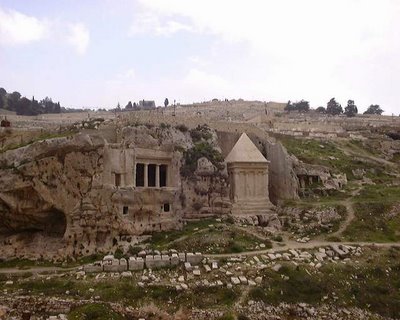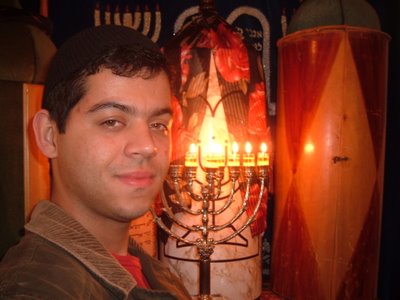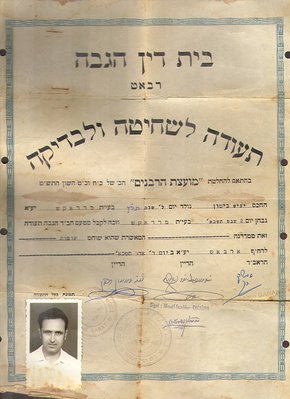Hillulah Day: Kislev-14Reuven ben Yaakov AvinuBorn: Aram Naharayim, 1600 BCE.Died: Egypt, 1445 BCE.Reuven was the son of Jacob the Patriarch and Leah the Matriarch. He is one of the 12 Tribes.
Yaakov's firstborn Reuven (Genesis 35:23). Reuven was conceived as a result of the first act of relations between Leah and Yaakov and from the first issue of Yaakov's semen, and he was the first to be born [to Leah], his was the genealogical birthright and the birthright of inheritance [he received a double portion of Yaakov's estate and was the first to receive an inheritance in the Land of Israel].
He was designated for the service of God, for until the service was transferred to the Tribe of Levi when the Tabernacle was erected, it was performed by the firstborn, he was the first to do repentance, and even the first to prophesy, as it is written, God spoke first with Hoshea (Hoshea 1:2) [who was descended from Reuven] (Bereishit Rabbah 82:11, Eitz Yosef).
The monetary rights of the firstborn [to receive a double inheritance in the Holy Land] were taken away from Reuven, and given to Joseph, but not the genealogical birthright, as it is written, The sons of Reuven, the firstborn of Israel (Numbers 1:20) (Bereishis Rabbah 82:11).
Reuven [means, see the difference between]. Leah said, "See the difference between my son and my father-in-law's sons, Esav. Although Esav sold his birthright willingly, Esav harbored hatred toward Yaakov (Genesis 27:41), whereas my son surrendered his birthright to Joseph against his will, yet he was not jealous of him. On the contrary, Reuven heard, and he rescued him from their hand" (ibid. 37:21) (Berachot 7b).
"Reuven, you are my firstborn" (Genesis 49:3). Yaakov said to him, "To your credit you are a firstborn and Esav is a firstborn. Esav went to the field to hunt game to bring (ibid. 27:5) - if he would find game to hunt, very well, if not, he intended to bring a stolen animal. You, however, took only that which was ownerless: Reuven went out in the days of the wheat harvest. He found dudaim growing wild in the field and brought them (ibid. 30:14). To your discredit: I, until the age of eighty-four when I married, had never had a nocturnal emission. But you - Reuven went and lay with Bilhah (ibid. 35:22). The birthright was yours, the priesthood was yours, the kingship was yours. Now that you have sinned, the birthright is given to Joseph, the priesthood to Levi, the kingship to Judah." Rabbi Acha said: Yaakov said, "The birthright was never rightfully yours. I went to Lavan only for Rachel. I consorted with your mother on our wedding night, when you were conceived, thinking she was Rachel. Now the birthright has been restored to its rightful owner [i.e., Rachel's firstborn, Joseph]" (Bereishit Rabbah 98:4).
Whoever says that Reuven sinned is mistaken. He tampered with his father's bed, and Scripture considers it as if he lay with Bilhah (Shabbat 55b).
Throughout the lifetimes of Rachel and Leah, the Divine Presence rested upon them. When they died, the Divine Presence did not leave the house but rested on the dwelling of Bilhah. Reuven came and tampered with the bed - that is, he slept on it - and he did not fear the Divine Presence (Zohar I, 175b).
Reuven said, "Father was to have produced twelve tribal ancestors, not more. Now he wishes to beget more more children. Perhaps it is because we are unfit." That is why [Reuven] tampered with the bed. (Zohar I, 176a). Reuven, Shimon, and Levi were the leaders of the Jewish people of Israel in Egypt. After Reuven died, the leadership was given to Shimon (Bamidbar Rabbah
13:8).
Reuben returned to the pit (Genesis 3729). He had been busy with his sackcloth and fasting repenting for his sin with Bilhah. The Holy One, Blessed is He, said to him, "Never has a person sinned before Me and repented unless faced with punishment. You were the first to repent, your descendant shall be the first to speak of the greatness of repentance." This refers to his descendant Hoshea, who said, "Return, O Israel, unto Hashem your God" (Hoshea 14:2) [i.e., repentance reaches unto the very Throne of Glory] (Bereishis Rabbah 84:19).
An example of one who asks with an illogical argument is Reuven, as it is written, Reuven said to his father....." You may slay my two sons if I fail to bring him back to you. Put him in my care" (Genesis 42:37) (Avod d' Rabbi Natan 37:13).
And Yaakov said, "My son shall not go down with you. My firstborn Reuven is an idiot, for he speaks of his sons as if I would not consider them also like my sons" (Bereishit Rabbah 91:13).
"You may slay my two sons" (Genesis 42:37), i.e., place them under ban (Targum Yonatan).
Reuven was buried across the Jordan in Rumia, which Moses gave Reuven's descendants as an inheritance (Sefer HaYashar, end of Yehoshua).
May the merit of the tzaddik
Reuven ben Yaakov Avinu protect us all, Amen.







